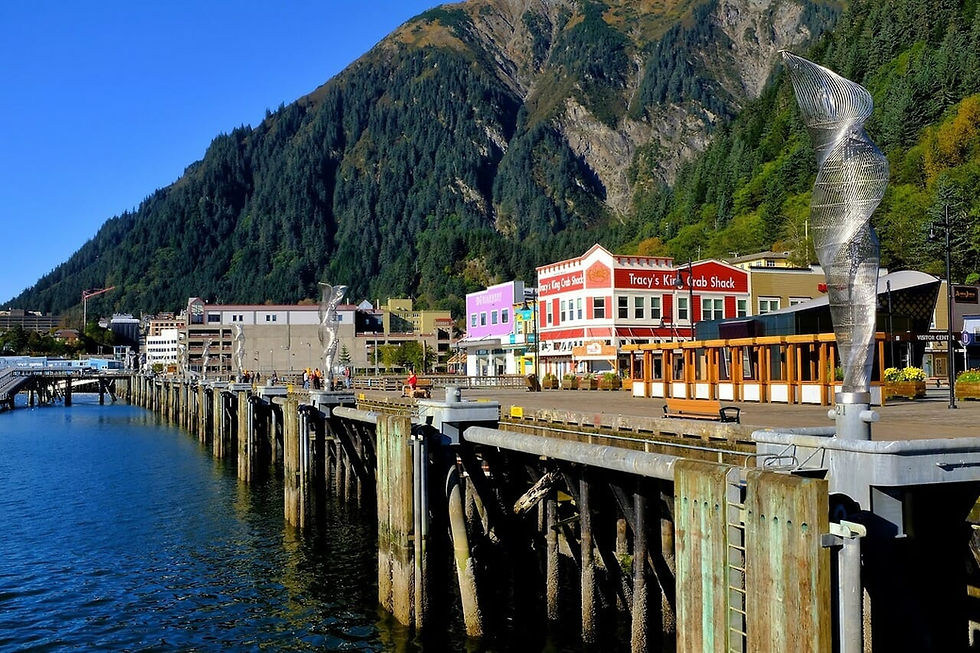Sidewalks or sign wars? Let’s protect Juneau’s downtown charm and each other
- Dorene Lorenz

- Jul 20, 2025
- 3 min read

Downtown Juneau is one of the most walkable, visually rich and historically unique places in Alaska. It's why we live here. It's why tourists keep coming back. But more and more, that experience is being compromised, not by crowds or cruise ships, but by an arms race of sandwich boards and sidewalk signs.
It might seem like a small issue, but it’s not. These unpermitted A-frame signs are creating serious problems for people with disabilities, for our tourism brand, and for business owners themselves.
Let’s talk about what’s really at stake.
Every summer, sidewalks fill with signage. Some is permitted and placed properly. But much of it is not. And when signs block the walking path, particularly in the Downtown Historic District, pedestrians — especially wheelchair users, visually impaired residents, and families with strollers — are forced to detour into the street.
That’s not just inconvenient. It’s dangerous. And it’s illegal under the Americans with Disabilities Act (ADA), which requires public walkways to remain accessible to everyone.
And when the city looks the other way? That’s not neutrality. That’s exposure. The City and Borough of Juneau could be held legally liable if someone is injured after being forced off a sidewalk obstructed by an unpermitted sign. It’s happened elsewhere. It can happen here. So why does this continue?
Because somewhere along the line, we stopped seeing these signs as a shared-space issue and started treating them as marketing tools. One shop puts out a sign. The next puts out two. The visual competition escalates, and suddenly we’re not preserving the district’s charm, we’re cluttering it. It’s sign wars — and no one really wins.
Downtown businesses, especially locally owned ones, deserve to be seen and supported. But signage shouldn’t come at the expense of accessibility, safety, or the very character that brings customers through our doors.
Historic tourism is one of our community’s economic engines. Visitors don’t come here to see a jumble of plastic A-frames and chalkboards choking narrow sidewalks. They come for the authenticity. The architecture. The beauty of a district preserved with care. When that ambiance is lost, so is value - literally. And that affects all of us.
There’s a better way forward.
We already have signage ordinances in place. The city code prohibits unpermitted sidewalk signs in the Downtown Historic District, with narrow exceptions. In 2015, the Assembly voted to increase fines, and even discussed a $500-per-day penalty for persistent violations. That ordinance wasn’t enacted, and the problem hasn’t gone away.
So what would it look like if we approached this as a shared responsibility, not a punishment?
First, businesses can choose compliance over conflict. If you use a sandwich board, apply for a permit and ensure it’s placed safely and legally. If it can’t meet ADA guidelines, don’t put it out. Not sure what the rules are? The city and the Downtown Business Association (DBA) are here to help.
Second, let’s treat the sidewalk as shared space, not a marketing battleground. Visibility matters, but so does our collective environment. What would it look like if we worked together to create coordinated signage guidelines that were beautiful, effective, and compliant with historic standards?
Third, the city needs to enforce its own rules. Not out of punishment, but out of fairness. It shouldn’t be cheaper to break the law than to follow it. Consistent enforcement supports good actors and protects the vulnerable.
Finally, we need to return to a shared vision of downtown Juneau, not as a free-for-all, but as a curated, people-friendly destination. When sidewalks are clear, everyone benefits: residents, visitors, and business owners alike.
This isn’t about policing each other. It’s about protecting something bigger than one storefront. It’s about creating a downtown we’re proud to walk through and where everyone can walk safely.
We all want Juneau to thrive. That starts with keeping the path clear, for commerce, for community, and for those who need it most.
• Dorene Lorenz is chair of the Alaska Human Rights Commission and a former member of the Alaska Historic Commission.












